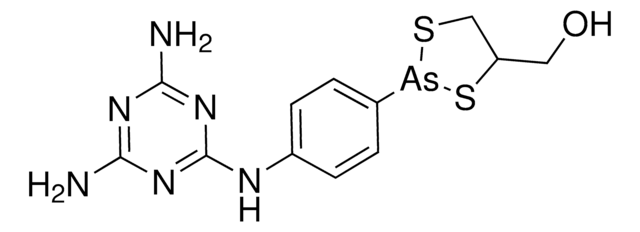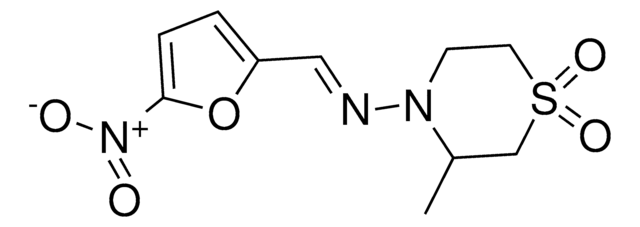SML2524
Fexinidazole
≥98% (HPLC)
Synonym(s):
1-methyl-2-[[4-(methylthio)phenoxy]methyl]-5-nitro-1H-imidazole, HOE 239
Sign Into View Organizational & Contract Pricing
All Photos(1)
About This Item
Empirical Formula (Hill Notation):
C12H13N3O3S
CAS Number:
Molecular Weight:
279.31
MDL number:
UNSPSC Code:
12352200
NACRES:
NA.77
Recommended Products
Assay
≥98% (HPLC)
form
powder
color
light yellow to dark brown
solubility
DMSO: 2 mg/mL, clear
storage temp.
−20°C
SMILES string
CN1C(COC2=CC=C(SC)C=C2)=NC=C1[N+]([O-])=O
Biochem/physiol Actions
Anti Trypanosoma, Leishmania agent.
Fexinidazole is a potent anti-Trypanosoma agent. Trypanosoma species human protozoan pathogens are responsible for sleeping sickness and Chagas disease. In vivo, fexinidazole is oxidized to sulfoxide and sulfone metabolites that are effective in blocking the progression of the parasitic disease visceral leishmaniasis. The mechanism of action appears to be by reductive activation via an NADH-dependent nitroreductase expressed by the parasites.
Storage Class Code
11 - Combustible Solids
WGK
WGK 3
Flash Point(F)
Not applicable
Flash Point(C)
Not applicable
Certificates of Analysis (COA)
Search for Certificates of Analysis (COA) by entering the products Lot/Batch Number. Lot and Batch Numbers can be found on a product’s label following the words ‘Lot’ or ‘Batch’.
Already Own This Product?
Find documentation for the products that you have recently purchased in the Document Library.
Victor Kande Betu Ku Mesu et al.
Lancet (London, England), 391(10116), 144-154 (2017-11-09)
Few therapeutic options are available to treat the late-stage of human African trypanosomiasis, a neglected tropical disease, caused by Trypanosoma brucei gambiense (g-HAT). The firstline treatment is a combination therapy of oral nifurtimox and intravenous eflornithine that needs to be
Marcel Kaiser et al.
Antimicrobial agents and chemotherapy, 55(12), 5602-5608 (2011-09-14)
Fexinidazole is a 5-nitroimidazole drug currently in clinical development for the treatment of human sleeping sickness (human African trypanosomiasis [HAT]), caused by infection with species of the protozoan parasite Trypanosoma brucei. The compound and its two principal metabolites, sulfoxide and
Alan H Fairlamb et al.
Current medicinal chemistry (2018-04-28)
Interest in nitroheterocyclic drugs for the treatment of infectious diseases has undergone a resurgence in recent years. Here we review the current status of monocyclic and bicyclic nitroheterocyclic compounds as existing or potential new treatments for visceral leishmaniasis, Chagas' disease
Our team of scientists has experience in all areas of research including Life Science, Material Science, Chemical Synthesis, Chromatography, Analytical and many others.
Contact Technical Service








